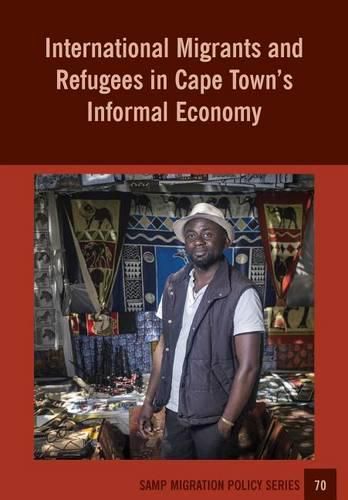Readings Newsletter
Become a Readings Member to make your shopping experience even easier.
Sign in or sign up for free!
You’re not far away from qualifying for FREE standard shipping within Australia
You’ve qualified for FREE standard shipping within Australia
The cart is loading…






This title is printed to order. This book may have been self-published. If so, we cannot guarantee the quality of the content. In the main most books will have gone through the editing process however some may not. We therefore suggest that you be aware of this before ordering this book. If in doubt check either the author or publisher’s details as we are unable to accept any returns unless they are faulty. Please contact us if you have any questions.
This is report is the most comprehensive study yet of the contribution of migrant and refugee entrepreneurs to Cape Town’s local economy. The survey of over 500 entrepreneurs engaged in trade, services and manufacturing in different areas of the city dispels some of the more prevalent myths that often attach to the activities of migrants. The vast majority are not illegal foreigners , but have a legal right to be in South Africa and to run a business. Most are highly motivated individuals who enter the informal economy to earn revenue to support themselves, their families, and because they have a strong entrepreneurial motivation. Contrary to the claims of South African competitors, the vast majority are not successful because they are engaged in shadowy business practices. What emerges from the survey is that while migrant entrepreneurs undoubtedly have strong social networks, their businesses are highly individualistic in terms of organization, ownership and activity in a competitive business environment. This report demonstrates their positive economic contributions to Cape Town and examines the challenges they face in running a successful business operation in the city. It goes beyond the rhetoric of inclusion to demonstrate with hard evidence exactly why migrant and refugee entrepreneurs should be accepted as an integral and valuable part of the local economy.
$9.00 standard shipping within Australia
FREE standard shipping within Australia for orders over $100.00
Express & International shipping calculated at checkout
This title is printed to order. This book may have been self-published. If so, we cannot guarantee the quality of the content. In the main most books will have gone through the editing process however some may not. We therefore suggest that you be aware of this before ordering this book. If in doubt check either the author or publisher’s details as we are unable to accept any returns unless they are faulty. Please contact us if you have any questions.
This is report is the most comprehensive study yet of the contribution of migrant and refugee entrepreneurs to Cape Town’s local economy. The survey of over 500 entrepreneurs engaged in trade, services and manufacturing in different areas of the city dispels some of the more prevalent myths that often attach to the activities of migrants. The vast majority are not illegal foreigners , but have a legal right to be in South Africa and to run a business. Most are highly motivated individuals who enter the informal economy to earn revenue to support themselves, their families, and because they have a strong entrepreneurial motivation. Contrary to the claims of South African competitors, the vast majority are not successful because they are engaged in shadowy business practices. What emerges from the survey is that while migrant entrepreneurs undoubtedly have strong social networks, their businesses are highly individualistic in terms of organization, ownership and activity in a competitive business environment. This report demonstrates their positive economic contributions to Cape Town and examines the challenges they face in running a successful business operation in the city. It goes beyond the rhetoric of inclusion to demonstrate with hard evidence exactly why migrant and refugee entrepreneurs should be accepted as an integral and valuable part of the local economy.